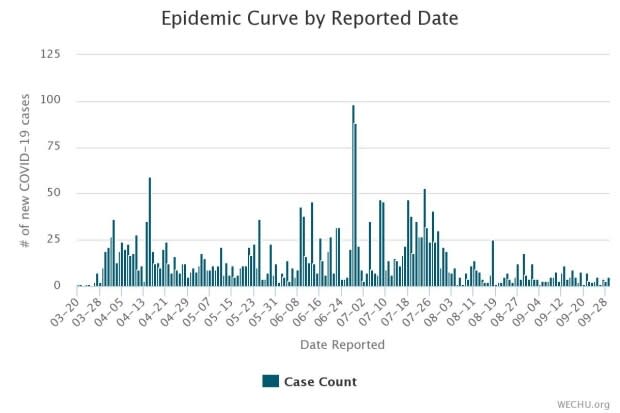Local COVID-19 cases low, but health-care officials still prepping for second wave in Windsor-Essex
What used to be a COVID-19 hotspot now has the spread of the virus seemingly under control, compared to other parts of the province.
But in Leamington — and across Essex County — health-care officials have not slowed down, even though new cases here are relatively low, said Dr. Ross Moncur, interim CEO and chief of staff at Erie Shores HealthCare.
"In many ways I think people feel there has been a bit of a lull over the last few months in terms of COVID-19 activity, but I can tell you the health-care partners in Windsor-Essex have taken no break," said Moncur.
"We're in a fairly good position at this point in terms of numbers, we've seen single-digit daily counts ... our hospitals themselves are not overburdened with COVID-19 patients."
But that's not the trend across Ontario, where new cases have been skyrocketing with a record 700 on Monday and another 550 on Tuesday. The majority of them in and around Toronto.
Premier Doug Ford says the province is embarking on the second wave of the virus, which he says will be worse than the first.

On Tuesday, medical officer of health Dr. Wajid Ahmed urged the public to do their part to ensure Windsor-Essex could remain open, explaining the premier had indicted regional closures could come down if numbers continue to climb.
"Right now we're already in a good spot and we need to stay there and we can only do that if all of us truly understand what is at stake," said Ahmed.
"It's truly in our hands how we keep our community safe, how we keep our businesses safe."
Moncur explained that health-care officials have revised protocols over the last few months in preparation for a second wave here locally.
As people have gone back to school and more coughs and colds are showing up, Moncur said assessment centres have changed the way they operate so that those who need a test to, for example, visit a loved one at a long-term care or retirement home do not interact with those who need a test because they are symptomatic.
They're also moving screening centres indoors, ahead of cold weather.

Ahmed said that businesses and people alike should also be reviewing their own procedures and protocols to make sure everyone is doing their part to keep people safe.
"I beg you all to make sure you are looking at your protocols, you are doing what you need to do to keep us in this same stage," he said.
"I'm confident that our people have done an excellent job in keeping the numbers down so I just want to make sure we're all following the same messaging again ... what we do right now will determine what the future will bring for us."
Moncur says it's up to everyone to remain diligent about symptoms and spread, especially this winter.
"We tend to want at this point in the year to write things off as allergies or another type of virus, but we need to be careful because COVID-19 is probably the most likely diagnoses in most people," said Moncur, adding catching cases early is a good way to prevent the spread.
He says anyone with a cough or cold-like symptoms should assume they have COVID-19 until it's proven they do not.
Moncur says controlling outbreaks at seniors' homes and schools will be very important moving into cold-weather months, as will ensuring hospitals have capacity for COVID-19 patients.
"I've always been most concerned about the metric of hospital cases," Moncur said, adding hospital admissions across the province are increasing at an alarming rate.
"That's a signal we will be under duress."


